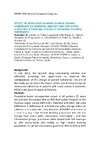Please use this identifier to cite or link to this item:
https://accedacris.ulpgc.es/jspui/handle/10553/52842
| Title: | Effect of drug cost-sharing change on nonadherence to essential medications for acute coronary syndrome: a population based natural experiment | Authors: | González, B. Librero, J. Peña-Logobardo, L. M. Bauer, S. Garcia-Sempere, A. Puig-Junoy, J. Oliva Moreno, J. Peiro, S. Sanfelix-Gimeno, G. |
UNESCO Clasification: | 531207 Sanidad | Keywords: | Gasto sanitario Economía de la salud |
Issue Date: | 2016 | Journal: | Value in Health | Abstract: | Objectives: In July 2012, the Spanish drug cost-sharing scheme was reformed, providing the opportunity to evaluate the consequences of this change on patient adherence.The aim of this study was to assess the impact of the cost-sharing change on medication non- adherence in patients with acute coronary syndrome (ACS) in the Spanish region of Valencia. Methods: Population-based retrospective cohort of all patients 35 years old and over discharged after an ACS from public hospitals in the Valencia region during 2009-2011, followed until 2013.We used Difference in Difference to estimate the policy change effect on non-adherence to antiplatelet, beta-blockers, ACEI/ARB and statins of a control group –low income working popula-tion who did not change their status (40% coinsurance, unchanged)- and two inter-vention groups: pensioners (who moved from full coverage to 10% coinsurance) and middle to high income working population, for whom coinsurance grew from 40% to 50% or 60% of drug cost. Results: No significant differences in non-adherence between intervention and control groups were found for medications with low price and low patient maximum coinsurance, such as antiplatelet and beta-blockers. For ACEI/ARB and statins, the policy change had an immediate effect in the propor-tion of non-adherence in the pensioner group as compared with the control group (6.8% and 8.3% increase respectively, p<0.01 for both). Non-adherence to statins significantly increased after the reform for the middle to high income group vs. control group (7.8% increase,p<0.01).However, those effects were transitory (p<0.01 for all medications). Conclusions: Coinsurance changes may lead to increased non-adherence to proven, effective therapies, especially for higher priced agents with higher patient cost share.Adherence was already sub-optimal before the cost-sharing policy change, with a clear cost/income gradient. Consideration should be given to fully exempt high risk patients from drug cost-sharing. | URI: | https://accedacris.ulpgc.es/handle/10553/52842 | ISSN: | 1098-3015 | DOI: | 10.1016/j.jval.2016.09.1800 | Source: | Value In Health [ISSN 1098-3015], v. 19 (7), p. A659, (Noviembre 2016) | Rights: | by-nc-nd |
| Appears in Collections: | Actas de congresos |
WEB OF SCIENCETM
Citations
4
checked on Feb 22, 2026
Page view(s)
96
checked on Jan 10, 2026
Download(s)
77
checked on Jan 10, 2026
Google ScholarTM
Check
Altmetric
Share
Export metadata
Items in accedaCRIS are protected by copyright, with all rights reserved, unless otherwise indicated.
